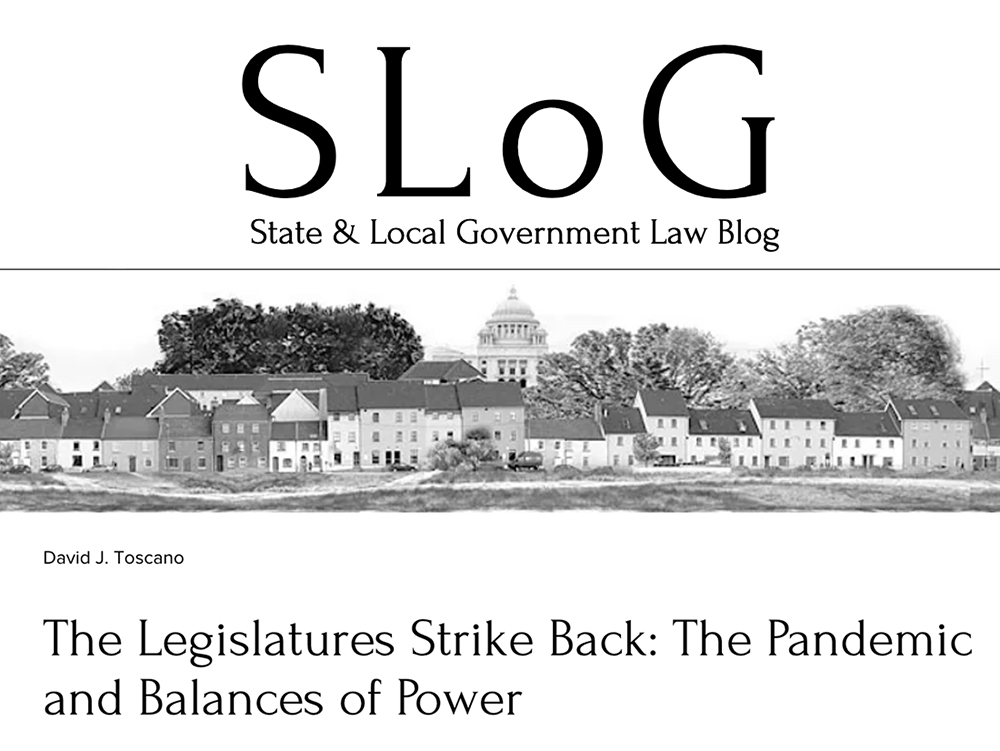After my retirement from the House of Delegates two years ago, I would frequently get the question, “do you miss it?” My response was typically: “I miss the major challenges. I would have loved to help develop the Virginia response to the pandemic.” I soon came to see that the legislature had little role to play; most of the decisions were made in the governor’s office. And it wasn’t only Virginia; governors across the country were controlling the response. My book, Fighting Political Gridlock discusses the early days of the pandemic and the state responses. In this post I discuss the dynamics of executive and legislative power. I hope you enjoy it.

You can read the full post here: https://www.sloglaw.org/post/the-legislatures-strike-back-the-pandemic-and-balances-of-power
P.S. Since the Virginia legislature will be considering measures to rein in executive power, some additional facts might prove useful:
- Thirteen states, including Virginia, place NO time limits on the duration of the declared emergency. Most states—twenty-eight—place time limits of various duration on states of emergency or the suspension of statutes. In most cases, the governor can unilaterally renew the state of emergency.
- Only nine states prevent the governor from renewing a state of emergency after its expiration without legislative approval. The nine include Washington, Wisconsin, Utah, Montana, Michigan, South Carolina, Kansas, Minnesota, and Alaska. The Virginia legislature should be mindful that to enact such a restraint would make it an outlier.
- The vast majority of states—thirty-seven—allow the governor to unilaterally suspend statutes and/or regulations where compliance would prevent, hinder, or delay necessary actions to deal with the emergency. This essentially gives the executive “the power to make law,” typically a legislative function. Va. Code 44-146.17 gives the governor the power “To proclaim and publish such rules and regulations and to issue such orders as may, in his judgment, be necessary to accomplish the purposes of this chapter including, but not limited to such measures as are in his judgment required to control, restrict, allocate or regulate the use, sale, production and distribution of food, fuel, clothing and other commodities, materials, goods, services and resources under any state or federal emergency services programs.” The statute provides civil penalties for violations. Virginia law requires the declaration to be sent to each member of the legislature.
- More than thirty states include some form of legislative oversight after emergency declarations. Virginia is not one of them. Twenty-seven states allow the legislature to overrule the declaration by concurrent or joint resolution at any time. Even if you had this rule in Virginia, it would be difficult to effect if the legislature was not in session when the emergency was declared. It would have to be called into special session which can only be done by the governor or a supermajority of the legislature. This suggests that any declaration automatically end at a specified time. One idea is to require approval of leaders in the legislature for the emergency to continue. Another would require the governor to call a special session after a specified period of the emergency to approve any changes in law or regulation enacted during it.
- There are many legal complexities in finding the right balance between the legislature and the executive. As a general rule, the more power granted to the governor (especially regarding the suspension of laws or regulations), the more important it is for the legislature to enact measures that determine how the emergencies end, or to construct a more consultative approach with the executive. There are not many models for consultative process in the states in this area. Hence, there is an argument to proceed slowly, even if it means postponing action by carry over or a reenactment clause.
Both the National Conference on State Legislatures and the Council of State Governments have useful information on executive orders. Thanks to these groups and Avi Weiss for some of data referenced above.

